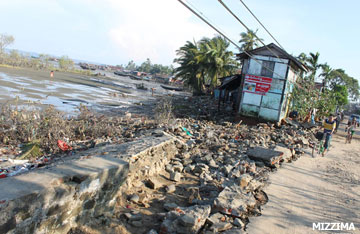New Delhi (Mizzima) – Paddy farmers in Arakan State in western Burma are worried that dykes damaged by Cyclone Giri will not be repaired before the rainy season and their crops will be flooded by seawater.
 The Arakan League for Democracy (ALD) and the Rakhine Nationalities and Development Party (RNDP) say work which is underway in some areas must be completed soon to allow farmers to grow paddy.
The Arakan League for Democracy (ALD) and the Rakhine Nationalities and Development Party (RNDP) say work which is underway in some areas must be completed soon to allow farmers to grow paddy.
With the help of nongovernmental organizations, workers are trying to repair the dykes, but some work is unlikely to be completed before the rainy season.
Farmers in Myebon Township are worried. ‘When I arrived, the residents were repairing some dykes with the help of private donors and nongovernmental organizations’, ALD leader Aye Tha Aung told Mizzima.
However, some of the work appeared inadequate, he said. ‘For instance, if a dyke is six feet, they could repair only three feet. If a lot of water rises, they can’t prevent the sea from flooding paddy fields in some areas. The Pankha Dyke in Myebon Township was badly damaged and it has not been repaired’.
He said that the authorities have not helped in repairing the dykes, and they have forced farmers to pay back agricultural loans received last year. Many farmers who have lost money because of Cyclone Giri badly need agricultural loans in order to plant paddy this season, he said.
Most of the paddy fields are located on islands along the Arakan coast. Dykes, often made of sand bags, hold back seawater from the paddies. Nongovernmental organizations pay about US$ 2 a day for workers to repair the dykes.
But in some villages in Kyaukphyu Township, for instance, nongovernmental organizations have been unable to provide repair money, according to Ba Shein, a member of the People’s Parliament from the RNDP. Most villages do not have enough money to do the work on their own, he said.
Some villages in Myebon and Pauktaw townships lack funds, so they can’t grow paddy this year, he said. As the result, he said some farmers are renting their land to businessmen to be used as prawn farms. As a result, salt water could seriously damage the paddy fields.
Another problem in the area, said Aye Tha Aung, is that food donations from nongovernmental organizations have been siphoned off by corrupt middlemen and some people received only a small portion of what was donated.
‘When the authorities went somewhere to inspect, the agents forced the residents to tell them they received all of the items’, Aye Tha Aung said.
In the cyclone-hit area, many residents also still face difficulty obtaining fresh water and adequate housing, and still need the support of international donors.
According to the latest report on Cyclone Giri by the United Nations Office for the Coordination of Humanitarian Affairs, the cyclone killed 45 people, damaged 15,000 houses and displaced 70,975 people.
Artists in Rangoon, including Lun Kywel and Win Pe Myint, are holding a five-day art exhibition at the Cultural University in Bahan Township to raise funds for cyclone victims.


